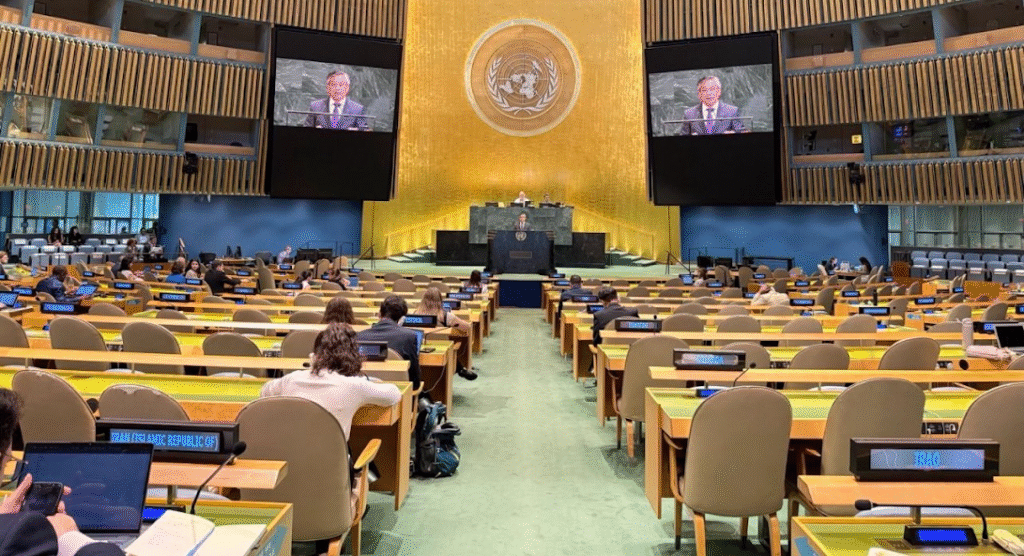Myanmar Spring Chronicle – June 27 View
(MoeMaKa, June 28, 2025)
U Kyaw Moe Tun Calls at UN Assembly for Swift R2P Action and ICC Arrest Warrant Against Min Aung Hlaing
Ambassador U Kyaw Moe Tun, representing the National Unity Government (NUG), called on the international community to implement the Responsibility to Protect (R2P) doctrine to safeguard the people of Myanmar and urged the International Criminal Court (ICC) to swiftly issue an arrest warrant for coup leader Min Aung Hlaing, during the 80th session of the UN General Assembly.
The appeal was made on June 25 at the UN commemorative forum marking the 20th anniversary of R2P, a global commitment to prevent genocide, war crimes, ethnic cleansing, and crimes against humanity. U Kyaw Moe Tun reiterated Myanmar’s ongoing humanitarian crisis and the urgent need for international protection.
Following the military coup in 2021, global discourse on R2P surged as Myanmar’s military opened fire on peaceful protesters and detained civilians. At the time, many citizens hoped that R2P would lead to meaningful international intervention. However, while the UN Security Council issued statements and recommendations, they lacked enforceable action and yielded limited practical impact.
It is fair to say that ASEAN and China have exerted more practical influence on Myanmar’s conflict than the UN. Over the years, the UN has gradually become a diplomatic stage dominated by global powers, often unable to take decisive action against war crimes, invasions, and mass atrocities. Its inability to respond effectively to ongoing crises in Gaza, Ukraine, and Iran is now clearly evident.
One glaring example is the UN’s failure to intervene in Gaza, where over two million people have been cut off from water, food, fuel, and electricity. The UN Relief and Works Agency (UNRWA) has also been repeatedly targeted by Israeli actions, without strong response from the UN system.
When this context is applied to Myanmar, the UN’s inability to prevent airstrikes that have killed hundreds of civilians comes as no surprise. Mere condemnation is not enough — the reality is that the UN has proven incapable of stopping the junta’s ongoing war crimes.
While the NUG has successfully secured a permanent representative seat at the UN through U Kyaw Moe Tun, this presence serves more as a diplomatic advantage than a mechanism for achieving real-world change. Nevertheless, his consistent and outspoken participation in major UN sessions continues to raise international awareness of Myanmar’s crisis.
UN media coverage often includes remarks from U Kyaw Moe Tun — a sign that his messaging cuts through, while the junta’s counter-narratives struggle to gain traction. Still, the NUG’s platform at the UN is not guaranteed forever, and Myanmar’s democracy movement must act swiftly to consolidate and expand this diplomatic foothold.
Also noteworthy is a separate statement by UN Special Rapporteur Tom Andrews, delivered on June 25, in which he called for international rejection of the junta’s proposed elections. He echoed U Kyaw Moe Tun’s message, urging the world to stand with the people of Myanmar, to halt the junta’s bombing campaigns and military offensives, and to ensure accountability.
Andrews highlighted the impact of international sanctions, noting that arms imports to the junta had dropped by one-third, thanks to coordinated efforts. He praised actions such as:
- Singapore’s 90% reduction of arms exports to Myanmar
- Thailand’s Bangkok Bank severing financial ties with Myanmar military-linked institutions, cutting off weapons funding channels
These developments are seen as modest yet meaningful progress in weakening the junta’s capabilities.
Despite the limited influence of the UN and international bodies amid the geopolitical self-interest of powerful nations, it remains essential to maintain consistent diplomatic pressure through these platforms. Sustained global attention on Myanmar’s crisis is still urgently needed.

